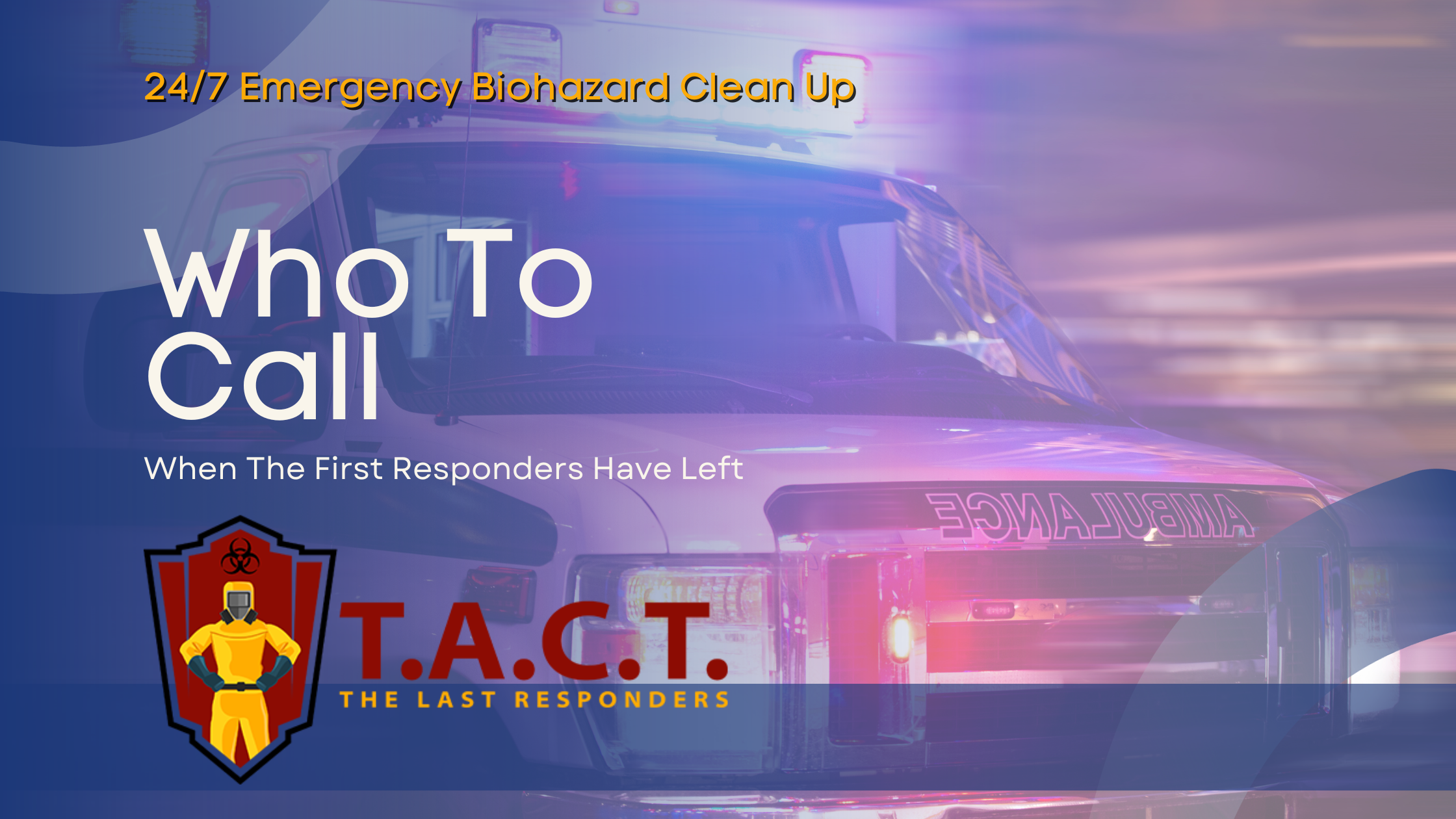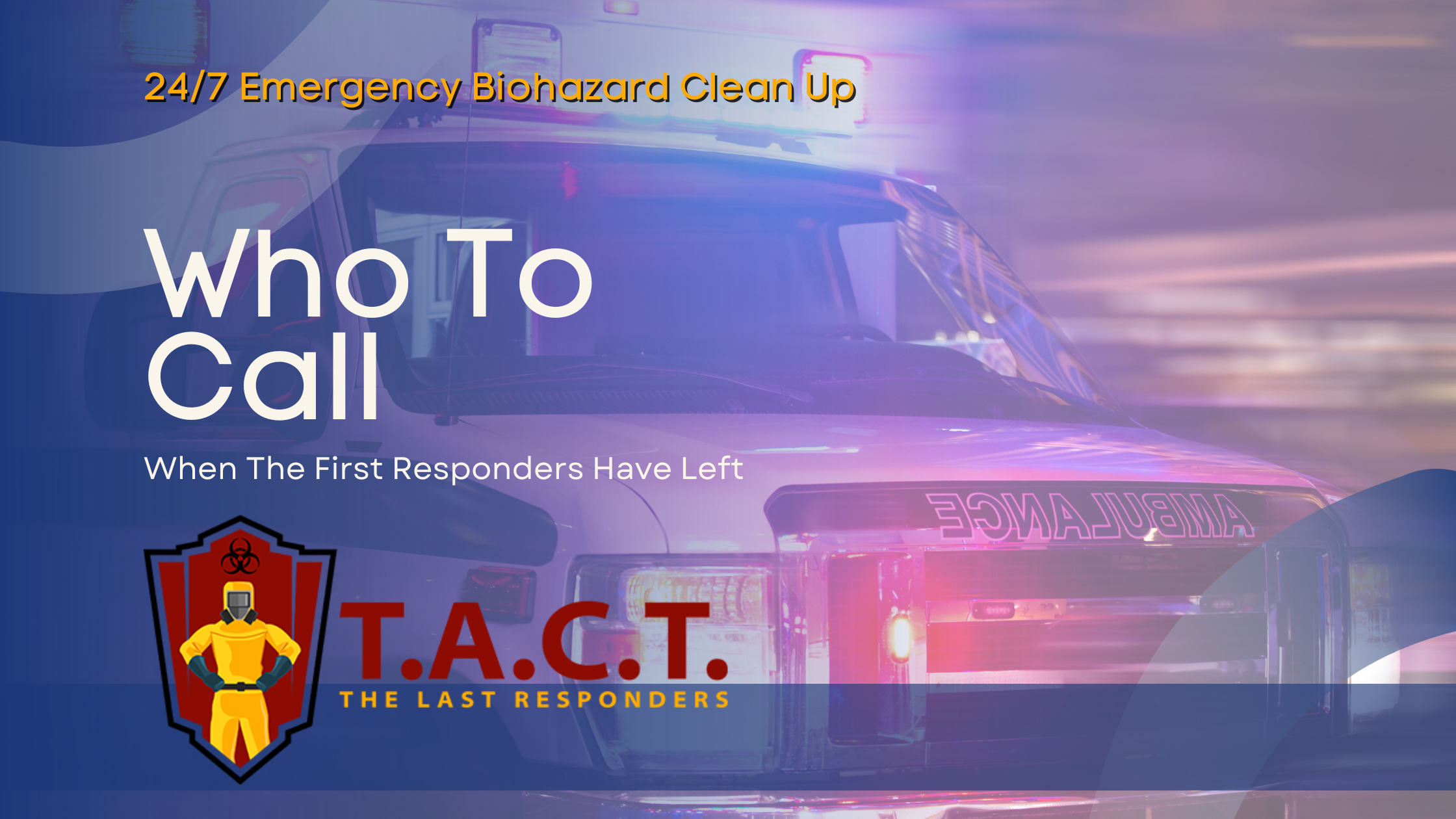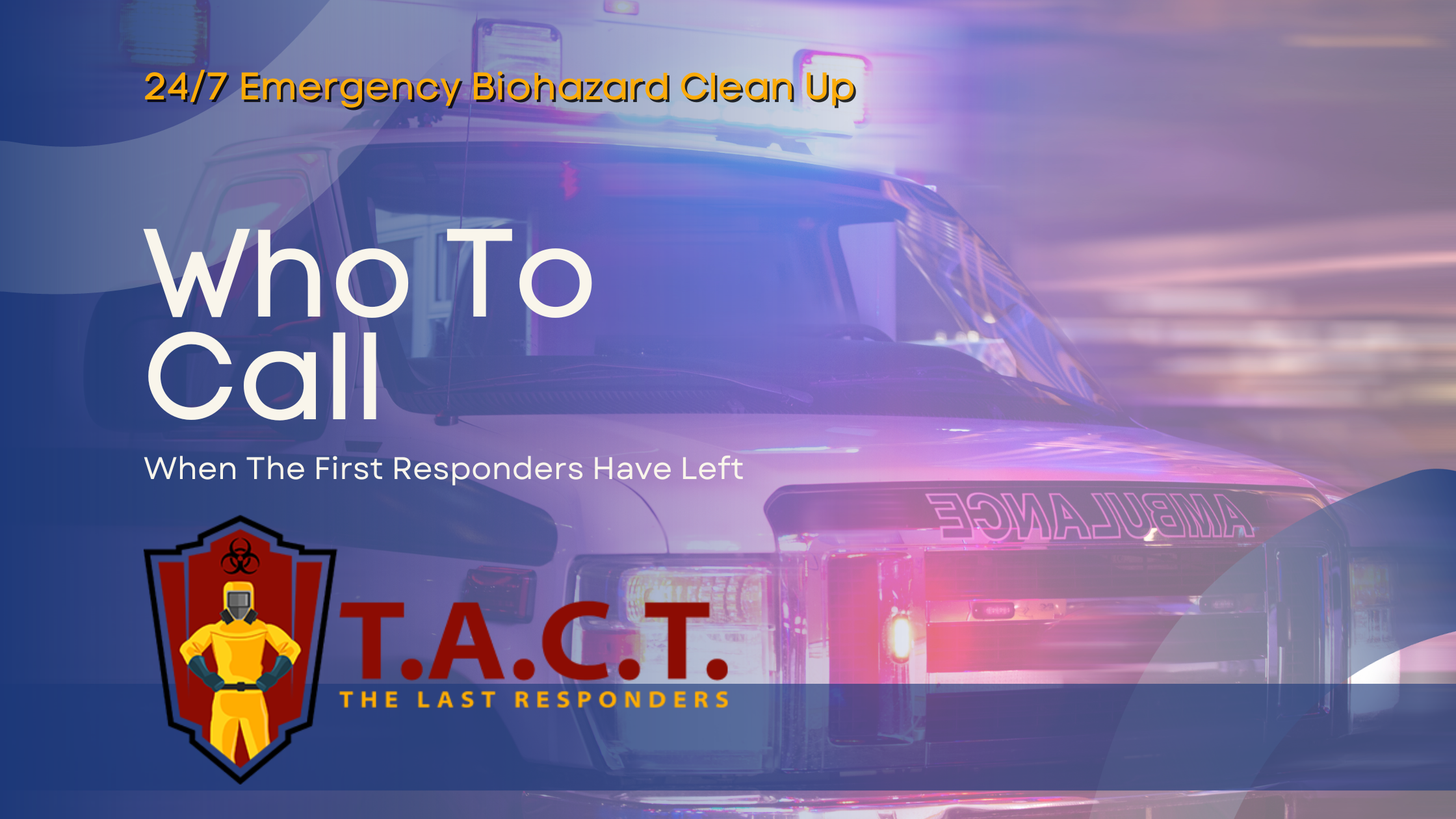Crime Scene Cleanup & Insurance Coverage Explained

Is Crime Scene Cleanup Covered By Insurance? Explained
Is Crime Scene Cleanup Covered by Insurance? Key Insights and Guidance
Crime scene cleanup is one of the most challenging and sensitive services carried out by trained professionals. Alongside crime scene cleanup, biohazard cleaning services are also performed by these experts to address hazardous situations. Beyond handling hazardous materials such as bloodborne pathogens and bodily fluids, these experts restore affected areas, bringing them back to safe, habitable conditions. However, one question often arises during these distressing times—is crime scene cleanup covered by insurance? Understanding the benefits of insurance coverage for crime scene cleanup can help ensure you receive the support and financial assistance you are entitled to, making the process less stressful.
Understanding the details of homeowners insurance policies is crucial for navigating this complex landscape. Knowing the claims process and how your service provider can coordinate with your insurance company is essential for a smoother and more efficient experience. This blog will explore whether crime scene cleanup is covered by insurance, what these services entail, scenarios such as accidents, crime, and traumatic events that may require cleanup, safety concerns, and how to find the right providers to assist during these trying moments.
Attempting biohazard disposal without professional help can be dangerous and may violate local laws, making it critical to rely on certified experts for safe and legal remediation.
Introduction to the Topic
The aftermath of a crime or traumatic event can leave property owners facing not only emotional distress but also serious health hazards. Crime scene cleanup services play a vital role in restoring safety and normalcy to a location after such incidents, addressing the risks posed by hazardous materials and biohazards left behind. Whether it’s a violent crime, accident, or other traumatic event, the cleanup process is essential for protecting the health of everyone who enters the affected area.
It is important to carefully review your insurance details, policy language, and policy terms to fully understand what is covered and what may be excluded when it comes to crime scene cleanup and biohazard remediation.
Homeowners insurance often provides coverage for biohazard cleanup, but the specifics can vary widely between policies. Insurers evaluate claims based on the specific policy language and terms, which can affect whether crime scene cleanup is covered. Understanding what your insurance covers is crucial to ensure you’re prepared for the aftermath of a crime or traumatic event. In this article, we’ll explore the ins and outs of crime scene cleanup, the types of damage and biohazards involved, and how to navigate the process of biohazard removal. Our goal is to help you understand your options, protect your health, and restore your property safely and efficiently.
Crime scene remediation requires professional expertise to ensure compliance with health and safety regulations, helping to prevent health risks and legal issues during the cleanup process.
Why Crime Scene Cleanup is Essential
When a crime or traumatic event occurs, the aftermath must be handled with care and precision to ensure the safety of everyone involved. Specialized crime scene cleanup services are designed to:
Remove and safely dispose of biohazards like blood, bodily fluids, and other contaminants.
Prevent the spread of diseases and maintain environmental safety.
Minimize the risk to health and safety through professional cleanup.
Restore the affected property to its original, usable condition.
Crime scene cleanup is required after homicides, suicides, unattended deaths, accidents, and traumatic injuries.
These essential services are performed by professionals trained to thoroughly clean and decontaminate the area, using specialized cleaning agents and techniques. Remediation is a critical part of the process, ensuring all hazards are eliminated and the environment is restored to a safe state. These professionals are committed to providing safe and effective cleanup for every situation. Delaying crime scene cleanup increases serious health risks, including the spread of infectious diseases, and can lead to further property damage.
Biohazard remediation is a critical part of crime scene cleanup, addressing serious health risks and ensuring compliance with safety regulations.
However, understanding what your insurance policy covers is critical to managing costs effectively.
Understanding Insurance Policies and Coverage
Most standard homeowners, renters, and commercial property insurance policies provide coverage for crime scene and biohazard cleanup, but the extent of coverage depends on the specific terms and exclusions of the insurance policy.
Does Homeowners Insurance Cover Crime Scene Cleanup?
Homeowners insurance frequently covers the cost of crime scene or biohazard cleanup. However, coverage depends on the specific terms and conditions outlined in your policy. Most standard homeowners, renters, and commercial property insurance policies provide coverage for crime scene and biohazard cleanup, but eligibility is determined by the policy language and policy terms.
What to look for in your policy:
Check for terms such as “biohazard cleanup,” “crime scene cleanup,” or similar language.
Ensure that accidental, non-criminal damage is included in cases such as accidental injuries or loss of life.
Here are some examples: Cleanup after a break-in or accidental death may be covered, while damage resulting from intentional criminal acts by the homeowner is typically not covered.
How to File a Claim
Steps to confirm your coverage:
Review your homeowners insurance policy carefully.
Reach out to your insurance agent to clarify terms and confirm whether biohazard cleanup is covered. Keep in mind that insurance companies are often unable to recommend specific crime scene cleanup providers due to legal restrictions.
Obtain written documentation of your policy’s coverage limits.
When processing an insurance claim, it is important to provide thorough documentation, including filing a police report, taking photographs, and keeping itemized invoices, to support your claim.
Documentation is critical for getting your insurance claim approved after a biohazard incident.
Policy Exclusions and Limitations
Policies differ between companies. While some may provide comprehensive coverage, others might exclude certain scenarios such as self-inflicted harm, suicide cleanup, or illegal activities. Many homeowners insurance policies exclude coverage for suicide-related cleanup unless an additional rider is purchased. Always focus on understanding the specific language and exclusions in your policy to avoid unexpected expenses. Reviewing your policy terms and policy language is essential to fully understand what is excluded and ensure you have the right coverage.
Types of Damage and Coverage
Crime scene cleanup services are equipped to handle a wide range of hazardous situations, from bloodborne pathogens and bodily fluids to tear gas residue and other dangerous materials, underscoring the critical role of professional crime scene cleaning services in these scenarios.. These biohazards can result from various traumatic events, including suicide, unattended death, or violent crime, and require specialized knowledge and equipment for safe removal and decontamination. Property damage, including broken windows and other bodily fluids, may require specialized cleanup and biohazard disposal to ensure safety, sanitation, and legal compliance.
What Does Insurance Typically Cover?
Homeowners insurance policies typically include some level of coverage for biohazard cleanup, but the extent of that coverage depends on your specific policy and insurance company, and can significantly affect your crime scene cleanup cost expectations and budgeting.. It’s important to carefully examine your policy to determine what types of scene cleanup, biohazard removal, and disposal of hazardous materials are covered. This includes understanding whether cleanup after events like suicide or unattended death is included, as well as the procedures for filing a claim. Crime scene cleanup costs can be covered by homeowners, renters, or business insurance, particularly under dwelling coverage or additional living expenses.
Why Professional Cleanup Is Necessary
Hiring trained professionals is essential for ensuring that all biohazards are properly removed and the environment is restored to a safe condition. Regulatory agencies such as OSHA set strict guidelines for biohazard cleanup, and reputable companies follow these standards to protect both their clients and their staff. By working with certified professionals and confirming your insurance coverage, you can ensure that the cleanup process is handled safely, thoroughly, and in compliance with all relevant guidelines.
Death Cleanup Coverage and Local Government
Dealing with the aftermath of a death on your property is not only emotionally overwhelming but can also present significant financial and health challenges. Homeowners insurance policies often include provisions for death cleanup coverage, helping property owners manage the cleanup costs associated with accidents, unattended deaths, or other tragic incidents. However, the extent of this coverage can vary widely, so it’s essential for homeowners to review their insurance policy details and understand exactly what is included.
In some situations, especially when the property owner is unable to pay for necessary cleanup or when the incident poses a broader risk to public health, local government agencies may become involved. Local authorities can sometimes provide assistance or resources to ensure that the property is safely restored, particularly if the cleanup is urgent or if there is a risk of harmful pathogens affecting the surrounding community.
What is Biohazard Cleanup?
Biohazard cleanup involves the safe removal, disposal, and decontamination of hazardous materials to restore a property. Since biohazard environments pose risks to health, strict safety protocols must be followed. It is essential to treat all biohazardous materials, including blood and bodily fluids, as potentially infectious to ensure the safety of everyone involved. Biohazard remediation is necessary to comply with health and safety regulations and to ensure proper handling of hazardous materials.
Crime scene cleanup is required after homicides, suicides, unattended deaths, accidents, and traumatic injuries, and these events often result in hazardous materials that must be professionally removed.
A thorough cleanup process must eliminate all traces of biohazards to prevent contamination and ensure the area is safe for reentry. Professional services are required to safely remove corpses and prevent the spread of infectious diseases.
Crime scene cleanup is required after homicides, suicides, unattended deaths, accidents, and traumatic injuries.
What's Included in Biohazard Cleanup?
Removal of contaminants: Bodily fluids, blood, and other biohazards—including other bodily fluids left behind at the scene—are safely removed, requiring proper biohazard disposal to prevent health risks and ensure legal compliance.
Decontamination: Specialized cleaning agents and methods eliminate pathogens to prevent disease.
Odor removal: Unpleasant odors caused by biohazards are neutralized.
Safe disposal: Biohazards are handled following OSHA and state regulations.
All procedures must comply with health and safety regulations to protect occupants and avoid legal penalties.
Ensuring a safe cleanup requires certified professionals equipped with industry-grade tools and personal protective equipment (PPE), as outlined in a complete guide to professional biohazard cleanup.).
The Cleanup Process
Cleanup can only begin after the police and other authorities have completed their work and officially released the scene.
Professional cleaning services can assist with the claims process and may communicate with insurance companies on your behalf, helping to streamline the experience for clients.
Crime scene cleanup follows a detailed process to ensure thorough and effective restoration of the affected property, similar to the steps described in a comprehensive guide to trauma and crime scene cleanup with T.A.C.T.:
Assessment: Trained professionals evaluate the scene to identify biohazards and determine the necessary steps. The assessment takes into account the outcome of the crime scene investigation, ensuring that cleanup proceeds only when all investigative procedures are complete. Documentation, such as filing a police report and keeping detailed records like photographs and itemized invoices, is important for processing insurance claims.
Containment: The contaminated area is sealed to prevent cross-contamination.
Removal and Disposal: All hazardous materials are carefully removed and disposed of safely.
Decontamination: The area is sanitized to eliminate harmful pathogens.
Restoration: Finally, the space is restored to a safe, habitable condition.
Each step prioritizes safety, compliance, and efficiency to handle the complexities associated with crime scenes.
Costs of Crime Scene Cleanup and Financing Options
Typical Cleanup Costs
The cost of biohazard cleanup varies based on factors such as the type and extent of damage, cleanup requirements, and location, and navigating these variables is part of the complex world of crime scene cleanup. The last thing property owners want to deal with is unexpected cleanup costs, and it's important to remember that insurance policy limits and deductibles can affect your out-of-pocket expenses. Cleanup costs can significantly impact both business owners and individual property owners, as commercial properties may face business interruption while individuals may struggle with unexpected expenses, especially after incidents that require specialized trauma cleaning services. For a person dealing with the aftermath of a traumatic event, the financial burden can be significant. On average, costs can range from $1,000 to $10,000 or more, depending on the severity. Cleanup costs may also be deductible as a casualty loss or business expense, depending on your situation.
Can Insurance Cover the Costs?
Homeowners insurance may partially or fully cover biohazard cleanup, reducing the financial burden. However, certain costs may remain out-of-pocket due to policy exclusions or limitations.
Financing and Assistance Options
For those without full insurance coverage, financial assistance or payment plans may help manage costs. If insurance does not cover the costs of crime scene cleanup, the responsibility typically falls to the property owner. Some cleanup service providers offer financing options or can assist in navigating public resources.
Many states offer crime victim compensation programs and state victim compensation programs, such as those run by the National Association of Crime Victim Compensation Boards, which may provide financial assistance for cleanup costs when insurance is unavailable or insufficient.
In many situations, no individual is legally responsible for the cost of crime scene cleanup, and the financial burden often falls to the property owner.
How to Find a Reliable Service Provider
Choosing the right crime scene cleanup company ensures the safety and effectiveness of the restoration. It is crucial to hire a qualified and licensed crime scene cleanup company to ensure compliance with regulations, mitigate liability, and guarantee safe, thorough remediation.
For rental properties, responsibility for crime scene cleanup may fall to the landlord or property owner, and legal considerations may apply. Determining who holds responsibility is important, especially if insurance does not cover the costs, to ensure prompt and proper cleanup.
Key qualities to look for:
Quality | Why It Matters |
|---|---|
Certifications and Compliance | Providers should follow OSHA and state safety regulations, and be certified by relevant organizations such as the American Bio Recovery Association (ABRA) or the Institute of Inspection Cleaning and Restoration Certification (IICRC). |
Professionalism | Look for companies that demonstrate professionalism through skilled, ethical, and compassionate service, especially in sensitive situations. |
Experience | Companies experienced in biohazard cleanup bring expertise and reliability. |
Specialized Equipment | Tools like HEPA filters and effective cleaning agents ensure thorough cleanup. |
Positive Reviews | Check online reviews and ask for referrals to verify reputation and quality. |
Local Providers | Choosing a local company can offer faster response times and valuable community knowledge. |
Selecting a reputable provider can make all the difference during an emotionally and logistically challenging time.
Safety Precautions for Crime Scene Cleanup
Crime scenes often contain hazardous material that poses significant health risks, including:
Bloodborne Pathogens: Viruses such as Hepatitis B, Hepatitis C, or HIV.
Airborne Risks: Harmful airborne particles can spread to unaffected areas.
Sharp Objects: Physical injuries may result from broken glass or sharp debris.
Why Professional Cleanup Matters:
DIY cleanup is not recommended due to risks to health and a lack of proper equipment. Leave the work to trained professionals who adhere to rigorous safety standards, minimizing exposure and ensuring complete decontamination.
Additional Resources for Emotional and Practical Support
Dealing with crimes or traumatic losses is physically and emotionally draining. Supporting loved ones after such an event is crucial, as they often need both emotional and practical assistance to cope with the aftermath.
Luckily, resources exist to support affected individuals:
Victim Assistance Programs: Offer financial and emotional support to victims and their loved ones.
Counseling Services: Help individuals and families process what has happened and begin recovery.
Community Support Groups: Provide comfort by connecting with others who've had similar experiences.
Insurance Advocates: Guide you through filing claims and maximizing your coverage.
Your Next Steps Toward Recovery
Ensuring a safe and thorough cleanup after a traumatic event is crucial for protecting your health and restoring your property. Here's what to do next:
Review and confirm your homeowners insurance policy coverage.
Contact certified crime scene cleanup professionals with biohazard expertise.
Explore financing options to manage costs effectively.
At T.A.C.T. North Atlanta, we understand the urgency and sensitivity of such situations. If you need assistance navigating cleanup, insurance, or finding additional resources, our trained professionals are here to help. Together, we'll make this process as seamless and compassionate as possible.
Learn more about our biohazard cleanup services or get in touch today.
Meta Data
Meta Title
Crime Scene Cleanup & Insurance Coverage Explained
Meta Description
Does insurance cover crime scene cleanup? Learn how policies, biohazard cleanup services, and professional providers can restore safety and peace of mind.



